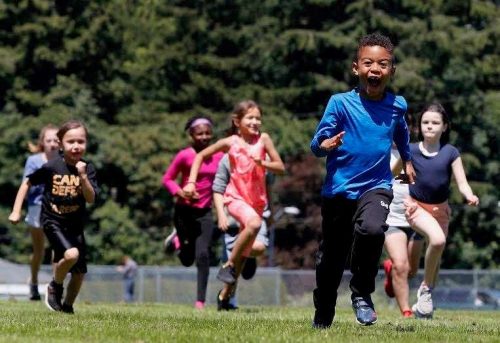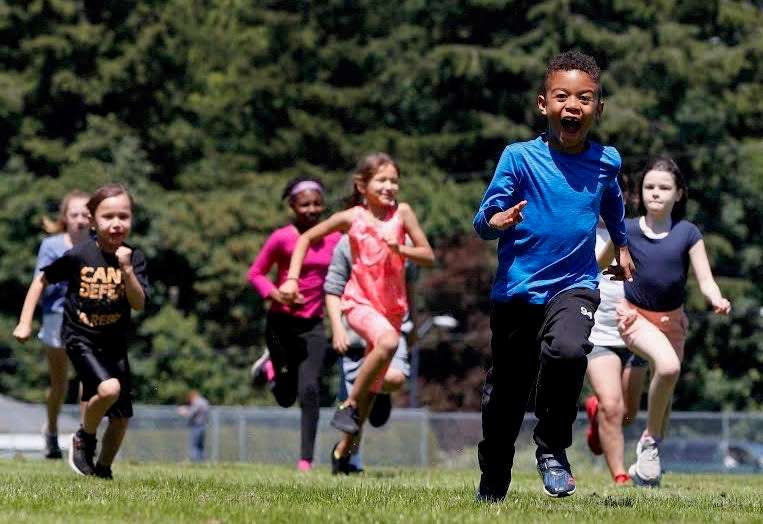Introducing the School Physical Activity and Physical Literacy Project
I t’s one of the largest scale endeavours Sport for Life has ever embarked on — the School Physical Activity and Physical Literacy Project — and when it’s completed it will have reached over 100 elementary schools in British Columbia.
t’s one of the largest scale endeavours Sport for Life has ever embarked on — the School Physical Activity and Physical Literacy Project — and when it’s completed it will have reached over 100 elementary schools in British Columbia.
“This is a unique opportunity for us to prototype different professional development opportunities for teachers related to physical activity and physical literacy. The end result will be a program that empowers elementary school teachers and support staff from K to 7,” said Project Lead Alex Wilson.
“The question we want to answer is ‘how can we best support teachers in better delivering the PHE curriculum?’”
The School Physical Activity and Physical Literacy Project is being developed, implemented and evaluated by Sport for Life, with a dynamic partnership that includes Indigenous Sport, Physical Activity and Recreation Council (I·SPARC), Childhood Obesity Foundation, and Physical and Health Education (PHE) Canada. The project is slated to begin in September 2020 — though the in-person components have been postponed until it is feasible and safe to offer them.
Sport for Life has a long history of working to develop physical literacy, but never at this scale. The professional development delivery needs to be appropriate for everything from multicultural urban settings, remote and rural areas, and for participating First Nations Schools Association (FNSA) schools. The training aims to empower teachers to increase their level of confidence and competence with the curriculum, increase the number of minutes during the day that students are engaged physically, and increase their understanding of how physical activity can support mental well-being. There will also be an emphasis on Indigenous perspectives of health and wellness, so that teachers can support their Indigenous students in a culturally safe way.
While developing new professional development opportunities and resources, as well as repurposing existing Sport for Life materials, input was sought from B.C. elementary schools teachers, physical education specialists, First Nation and Métis educators, and physical literacy experts. All materials were reviewed based on the B.C. PHE Curriculum and by teachers whom the resource is targeted at.
According to the overall lead for the I·SPARC project management team, Robynne Edgar, and project coordinator Lisa Gillies, the School Physical Activity and Physical Literacy Project is a unique opportunity to meet a critical need for Indigenous students. Having worked with Sport for Life to develop resources and workshops in the past, Edgar believes the program strikes the right balance of mobilizing knowledge while recognizing the unique needs of each individual, and customizing their approach based on the particular needs of the community.
“We’ve always wanted to focus on schools and now with a full-time staff member designated to support us, this allows us to achieve some of our goals. We’ve been able to look at our overall strategies relating to schools and can now begin to put them into action. It’s going to be amazing,” said Edgar.
“We know our communities, and we’re going to do what’s best for them.”
True to Sport for Life’s core value of working together, third party delivery agents have been contracted to deliver the program regionally, many of them building on pre-existing relationships with the schools involved. Third party agents such as Engage Sport North and Pacific Institute for Sport Excellence (PISE) will hire physical literacy leads who will support a minimum of six sessions in the school, introducing physical literacy in a number of environments including the classroom, the hallway and outside.
The project will provide virtual workshops with a live facilitator, a webinar series about emerging trends and hot topics, eLearning courses that align with the needs of B.C. educators and access to Sport for Life’s cloud-based content management app PLAYBuilder. Teachers will be able to access curriculum-linked grade-level packages of easy-to-use games and lesson plans. A simple educator-friendly website will serve as an access for all the classroom and school resources, which will be available for download for free. Hard copies will also be distributed. An online one-week intensive summer institute was held through the University of British Columbia to allow educators opportunities for development outside of the school year.
Once it’s safe and feasible to do so, in-person workshops that provide practical information about how to incorporate physical activity and physical literacy into the school day will be offered. Additionally, an in-school support series will place a physical literacy lead in a school for a minimum of six days to provide one-on-one professional development sessions during the day, with a focus on increasing educators’ competence and confidence delivering the new B.C. PHE curriculum.
“While Sport for Life has been promoting the development of physical literacy for 15 years, we are currently reminded of the critical value of physical activity to help students stay safe and stay healthy as they cope with, contain, and combat COVID-19 ,” said Wilson.
“We really appreciate that the Ministry of Health is helping us support B.C.’s elementary school teachers to learn what works well for them, and gather information to assist them in the future.”
For more information about the School Physical Activity and Physical Literacy project please contact Alex Wilson, Project Lead at spapl@sportforlife.ca.

